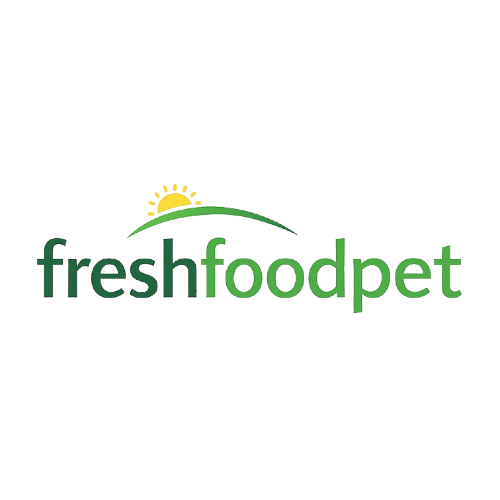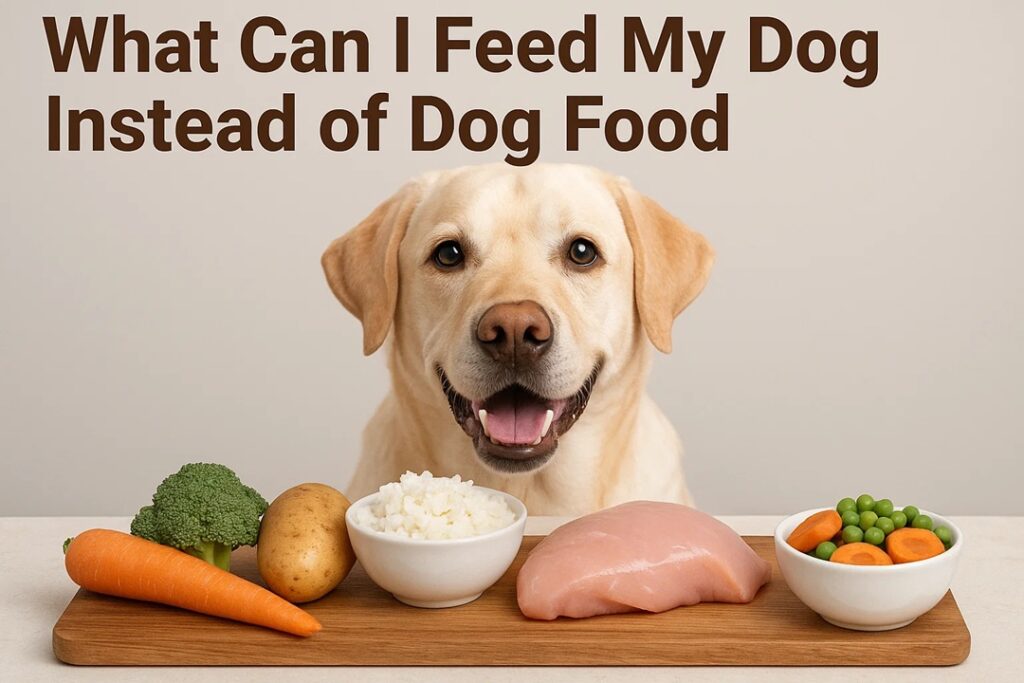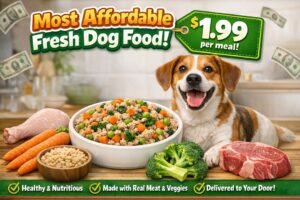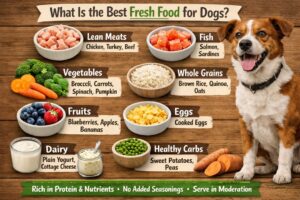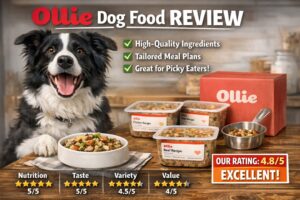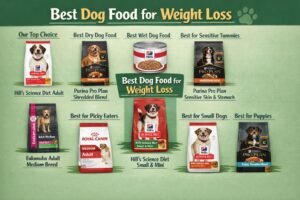As a loving dog parent, you want the very best for your furry friend—including their diet. While commercial dog food is designed to provide balanced nutrition, there are many healthy, natural alternatives you can feed your dog instead of traditional dog food. Whether you’re looking to supplement their diet, make homemade meals, or temporarily replace dog food, it’s essential to choose safe, nutritious ingredients.
In this comprehensive guide, we’ll explore the best human foods you can feed your dog, their benefits, and important feeding tips to keep your pup happy and healthy.
Carrots: Crunchy and Full of Goodness
Carrots are one of the safest and healthiest snacks you can give your dog. They’re low in calories, high in fiber, and packed with vitamin A, which supports good vision and a strong immune system.
👉 Feeding Tip: Serve raw carrot sticks for a satisfying crunch, or steam them to make them softer for senior dogs.
Eggs: A Protein Powerhouse
Cooked eggs are an excellent source of protein and essential amino acids. They’re gentle on the stomach and can even help soothe mild digestive issues.
👉 Feeding Tip: Always serve cooked eggs—either boiled, scrambled (without butter or salt), or poached. Raw eggs can pose a risk of salmonella.
Broccoli: A Nutrient-Rich Green
Broccoli is rich in fiber, vitamin C, and antioxidants. In small quantities, it’s a great addition to your dog’s diet.
👉 Feeding Tip: Steam or boil the broccoli and chop it into small pieces. Too much broccoli can cause gas, so feed in moderation.
Brown Rice: A Gentle Grain
Brown rice is an easily digestible carbohydrate that gives dogs energy and helps regulate their digestive system. It’s also a great option if your dog is recovering from stomach upset.
👉 Feeding Tip: Serve plain, fully cooked brown rice without salt, oil, or seasoning.
Green Beans: Low-Calorie Treats
Green beans are loaded with vitamins and minerals like iron, calcium, and vitamin K. They’re low in calories, making them perfect for overweight dogs.
👉 Feeding Tip: Serve cooked or raw green beans, but avoid canned beans with added salt.
Chicken: Lean and Tasty
Chicken is a popular protein source that most dogs love. It’s easy to digest and supports muscle development.
👉 Feeding Tip: Serve plain boiled or grilled chicken without seasoning, onions, or garlic. Remove bones and skin before feeding.
Pumpkin: A Digestive Aid
Pumpkin is full of fiber and nutrients like potassium and beta-carotene. It’s often recommended to support digestion and ease diarrhea or constipation.
👉 Feeding Tip: Use plain cooked or canned pumpkin (not pumpkin pie filling). Add a spoonful to your dog’s regular meal
Yogurt: A Probiotic Boost
Plain, unsweetened yogurt can be a good source of calcium and beneficial probiotics, which support a healthy gut.
👉 Feeding Tip: Avoid flavored or sweetened yogurts, especially those containing xylitol, which is toxic to dogs.
Fish: Omega-3 for Skin and Coat
Fish such as salmon and sardines are excellent sources of protein and omega-3 fatty acids. These nutrients support a shiny coat, healthy skin, and brain development.
👉 Feeding Tip: Serve cooked, boneless fish. Avoid raw fish and seasonings.
Fruits: Natural Sweet Treats
Many fruits are safe for dogs and can make excellent snacks. Apples, bananas, and blueberries are among the healthiest choices.
- Apples: Rich in fiber and vitamin C. Remove seeds and core before feeding.
- Bananas: High in potassium and vitamins but should be fed in moderation due to sugar content.
- Blueberries: Packed with antioxidants that help support the immune system.
👉 Feeding Tip: Serve fruits as bite-sized treats and avoid grapes, raisins, and citrus fruits.
Peanut Butter: A Favorite Treat
Peanut butter is a great source of healthy fats and protein. Most dogs love it, and it can be useful for training or hiding medication.
👉 Feeding Tip: Choose natural peanut butter without added sugar or xylitol. Feed in moderation because of its high fat content.
Sweet Potatoes: A Superfood for Dogs
Sweet potatoes are loaded with fiber, beta-carotene, and vitamins B6 and C. They support digestion and immune function.
👉 Feeding Tip: Cook sweet potatoes thoroughly (boiled, baked, or steamed) and serve plain, without seasoning or butter.
Turkey: A Lean Protein Alternative
Turkey is another excellent lean meat option. It’s gentle on the stomach and full of nutrients.
👉 Feeding Tip: Offer cooked, plain turkey without skin, bones, or seasoning.
Cheese and Dairy Products
Many dogs can tolerate cheese in small amounts, and it can be a great training treat. However, some dogs are lactose intolerant, so introduce dairy slowly.
👉 Feeding Tip: Use low-fat cheese options like mozzarella or cottage cheese, and monitor your dog for any digestive issues.
Grains and Oatmeal: Energy and Fiber
Whole grains like oatmeal provide essential carbohydrates, fiber, and vitamins. Oatmeal is especially beneficial for dogs with sensitive stomachs or allergies to other grains.
👉 Feeding Tip: Cook oatmeal with water only—no milk, sugar, or flavorings.
Beef and Lean Meats: Muscle Builders
Cooked lean beef provides valuable protein, iron, and essential nutrients. It’s a great base for homemade dog meals.
Feeding Tip: Trim fat, cook thoroughly, and avoid seasoning. Ground beef or lean cuts work best.
Important Feeding Guidelines
While these foods are safe and healthy, balance and moderation are key. Here are some essential tips to keep in mind:
- Introduce new foods slowly to prevent digestive upset.
- Avoid harmful foods like chocolate, onions, garlic, grapes, raisins, and anything containing xylitol.
- Watch portion sizes. Treats and extras shouldn’t make up more than 10% of your dog’s daily diet.
- Consult your veterinarian before making major changes to your dog’s diet, especially if they have allergies or health issues.
Sample Homemade Dog Meal Idea
Here’s a simple, balanced meal you can prepare at home:
Ingredients:
- 1 cup cooked brown rice
- ½ cup boiled chicken (shredded)
- ¼ cup steamed carrots and green beans
- 1 tablespoon plain pumpkin puree
Instructions:
Mix all ingredients thoroughly and allow to cool before serving. Adjust portion sizes based on your dog’s weight and activity level.
Final Thoughts: Natural Alternatives Can Be Healthy and Delicious
Feeding your dog natural, whole foods can be a rewarding way to improve their nutrition and strengthen your bond. From lean meats and fresh veggies to fruits and grains, there are many healthy alternatives to traditional dog food.
However, it’s essential to ensure a balanced diet that meets all of your dog’s nutritional needs. For long-term homemade feeding, consider working with your vet or a canine nutritionist to create a complete meal plan.
FAQ: Feeding Dogs Human Foods
Q: Can I replace dog food with homemade meals permanently?
Yes, but you must ensure the meals are nutritionally balanced. Consult your vet or a pet nutritionist before making a full switch.
Q: How often can I give my dog treats like peanut butter or cheese?
Treats should make up less than 10% of their daily calories. Offer these foods in moderation.
Q: Can puppies eat the same human foods as adult dogs?
Generally yes, but in smaller portions and with extra attention to balanced nutrition for growth. Always check with your vet.
Q: Which human foods should I avoid?
Avoid chocolate, onions, garlic, grapes, raisins, alcohol, caffeine, and foods with xylitol—they’re toxic to dogs.
